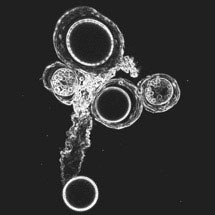 The social amoeba Dictyostelium discoideum is used widely in the laboratory as a convenient ‘model organism’ to help discover, among other things, how cells move, and how they fight bacterial infection. In the soil under your feet and in forest leaf litter, where it normally lives, this organism also goes through an enigmatic sexual cycle. Mating of two cells produces a cannabilistic zygote that then consumes other amoebae, after first eliciting their cooperation in producing the walled, resistant cyst in which it is to reside. This species is also unusual in having three sexes, each of which can mate with each of the others, but not with itself.
The social amoeba Dictyostelium discoideum is used widely in the laboratory as a convenient ‘model organism’ to help discover, among other things, how cells move, and how they fight bacterial infection. In the soil under your feet and in forest leaf litter, where it normally lives, this organism also goes through an enigmatic sexual cycle. Mating of two cells produces a cannabilistic zygote that then consumes other amoebae, after first eliciting their cooperation in producing the walled, resistant cyst in which it is to reside. This species is also unusual in having three sexes, each of which can mate with each of the others, but not with itself.
In the December 10th issue of Science, Gareth Bloomfield and Rob Kay from the LMB’s Cell Biology Division, in collaboration with researchers from the Wellcome Trust Sanger Institute and the University of Tsukuba, Japan, report the discovery of the genes that specify the three sexes of Dictyostelium discoideum.
Just as the sexes of plants and animals are controlled by genes on their sex chromosomes, Bloomfield and co-workers argued that there might be sex-determining genes to specify the Dictyostelium sexes. Beginning with very scant clues, they scanned the Dictyostelium genome and pinpointed a single gene as a candidate to specify one sex. They found that instead of this single gene, a second sex has two genes at the same place in its genome, and the third sex has three genes, resembling a fusion of the other two versions. They proved that these genes do indeed control the sex of amoebae by switching them from one cell to another, and so changing their sex. The key genes responsible for determining the amoebal sexes are not related to any known in other organisms, showing that a completely new mode of sex-determination has been discovered.
The novelty of the sex determination system of Dictyostelium is important because it may be the first glimpse of previously unknown systems used in the Amoebozoa. It is also hoped that this discovery will speed up the investigation of cell movement and other aspects of the biology of Dictyostelium.
Further references:
Access to full-text article in Science ‘Sex determination in the social amoeba Dictyostelium discoideum.’ (DOI: 10.1126/science.1197423)
Richard H Kessin’s Science paper ‘Sex and Sacrifice’ [DOI:10.1126/science.1199899]
Rob Kay’s Group Page